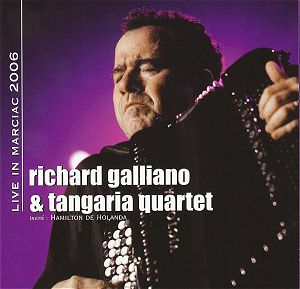1. Tango pour Claude
2. Laurita
3. Chat Pître
4. Tangaria
5. Présentation des musiciens
6. Fou Rire
7. Sertão
8. Disparada
9. Chorinho Pra Elé
10. Traditionnel Vénézuélien
11. Spleen
12. Libertango
13. Escualo
14. Sanfona
15. New York Tango
Richard Galliano – Accordion
Alexis Cardenas – Violin
Phillipe Aerts – Double bass
Rafael Mejias - Percussion
Hamilton de Holanda – Mandolin (tracks 6-8,
14, 15)
When
I saw accordionist Richard Galliano two years
ago when he was on a short European tour,
I was amazed that anyone could draw so many
sounds and textures from the accordion. It
has not exactly been a frequently-used instrument
in jazz, although devotees will remember such
rare exponents as Joe Mooney, Art van Damme,
Tito Burns and Tommy Gumina. Even George Shearing
was an accordionist in his younger days. At
any rate, Richard Galliano puts most of them
into the shade.
When
I heard Galliano with his New York Trio (a
different group), the style was predominantly
jazz but on this album it is as much tango
as jazz, although there is still plenty of
jazz improvistion. The accordion carries with
it an exotic atmosphere from its associations
with France, Mexico and various forms of folk
music, and Galliano’s music embraces many
of these and other influences. On this album
you will encounter jazz, tangoes, French musette,
the classics and many other strands, which
Richard weaves into an appetising mixture.
What they all have in common is rhythmic vitality
– as well as technical brilliance. These qualities
are in evidence from the very first track
– the first of several compositions by Galliano.
It is a lively tango with a descending chromatic
structure which tugs at the heart. Laurita
has a similar poignant fall, with jaunty solos
from bassist Philippe Aerts and violinist
Alexis Cardenas (shades of Stephane Grappelli!).
Chat Pître has more the feel
of the French musette
Mandolin-player
Hamilton de Holanda joins the quartet from
tracks six to eight, adding to the already
high level of impressive musicianship. Fou
Rire moves so quickly as to defy belief,
and the violinist sounds as if he is trying
to saw through his instrument! The violin
is also featured in Traditionnel Vénézuélien
(which is actually a gigue from a Bach suite),
with a pyrotechnic display which raises the
audience to new heights of excitement. Mandolinist
Hamilton de Holanda gets his own solo on Disparada,
another virtuosic feature which threatens
to steal the show. But Galliano is an equally
remarkable musician, and his duet with Hamilton
on Chorinho pra Elé has
notes springing from their fingers at top
speed, like two fountains going berserk together.
Libertango
and Escualo were written by the doyen
of tango, Astor Piazzolla. The former is a
multi-faceted solo by Richard Galliano; the
latter is a jovial piece with the violin prominent.
Hamilton rejoins the quartet for the last
two numbers. They are both Galliano compositions:
the Gallic-sounding Sanfona and the
catchy New York Tango, making a fittingly
dazzling finale from a superb ensemble.
Tony Augarde
